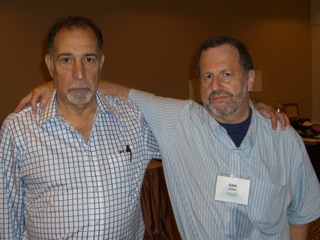December 1997 (continued):
After surviving a sudden flu attack in Essex, England, I flew to Hamburg, Germany.
After collecting my luggage at the airport, I found myself stymied by an escalator that was motionless. Yes, I could have walked up the motionless escalator, but to do so while pulling my luggage cart behind me would have proven difficult.
I looked around in vain for an elevator and then, resignedly, trudged to an airport information counter and said, “The escalator seems to be broken. How do I get upstairs?”
“No, it’s not broken,” I was told. “Just step onto it, and it will begin to move.”
An escalator that moves only when someone steps onto it? Makes perfect sense, and by now I’m sure you’ve experienced at least one of those, too. But at the time, I’d never heard of one.
After solving the mystery of the non-moving escalator, I made my way to arriving passengers’ greeting area, where Delta Radio’s Maren Hasenpath was waiting to drive me on the hour’s journey to the town of Kiel. (This was a return visit to Delta Radio, arranged by Adam Hahne.)
Checking into the Hotel Berliner Hof that evening, I discovered to my dismay that the hotel did not have a restaurant. So I bundled up and braved the bitterly cold Kiel winter evening, looking for a place to eat.
Wait: When I say “bitterly cold,” what I mean is:
This might have been the single coldest evening I’ve ever experienced. I do not recommend vacationing in Kiel in December.
The only place I could find whose menu I could interpret was, alas, a McDonald’s.
My perfect evening was capped off by several frustrating hours in my hotel room, trying unsuccessfully to connect to *Compuserve (for some reason always a challenge in Germany).
*Remember Compuserve? Remember “dial-up”?
The following morning I worked with Delta Radio’s morning show; after lunch I presented Power Phones to the entire air staff.
Then it was back to Hamburg, where I spent another evening in another hotel swearing at Compuserve and the German telephone system.
At the instigation of Ina Tenz, the programming staffs of FFN, Radio Hamburg, and Antenne MV met the following day for my Air Personality Plus+ seminar.
At the end of the day, Rick Demarest gave me a ride back to Hamburg Airport; I flew to London, spent the night at an airport hotel, and flew back home the following day…just in time to unpack and then pack again for the annual family trip to Connecticut for the holidays.




